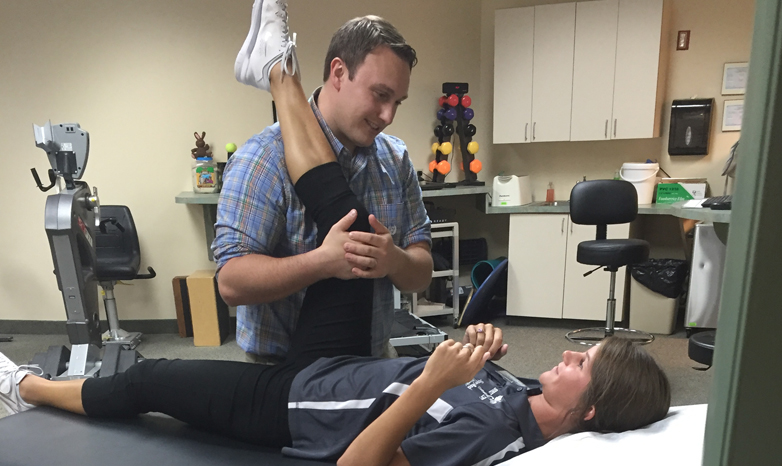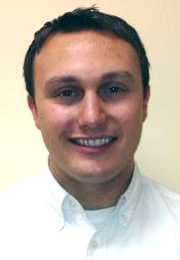SRU PT instructor promotes “hands on” approach

David Thompson, who earned a doctorate in physical therapy from Slippery Rock University in 2009 and is now a summer session instructor, works with a patient.
July 27, 2016
SLIPPERY ROCK, Pa. - Despite technology continuing to play a huge role in the delivery of modern health care solutions, David Thompson prefers using an "old school" instrument when helping patients on the road to recovery - his hands.
Thompson, who earned a doctorate in physical therapy from SRU in 2009 and is a practitioner with Allegheny Chesapeake Physical Therapy in Wexford, is a proponent of manual therapy.
Manual therapy encompasses techniques designed to diagnose and treat soft tissues and joint structures for the purpose of modulating pain; increasing range of motion; reducing or eliminating soft tissue inflammation; inducing relaxation; improving contractile and non-contractile tissue repair, extensibility, and/or stability; facilitating movement; and improving function.

THOMPSON
Thompson - one of three SRU doctoral graduates teaching in the PT program this summer, along with Casey Unverzagt, '06 and Sung-Ah Keppel, '10 - said manual therapy can particularly benefit patients with lower back pain.
Because manual therapy involves restoring mobility to stiff joints and reducing muscle tension in order to return the patient to more natural movement without pain, its use may provide relief both for patients with chronic back pain involving joint problems, such as sacroiliac joint dysfunction, and acute back pain from soft tissue injuries such as a back muscle strain or a pulled back ligament.
While physical therapists have always used their hands to provide treatment, previous measures were much more basic, featuring such things as muscle massage. Today's manual therapy techniques not only can be used to relax muscles, but provide additional benefits including: increased circulation; easing of arthritis pain; breaking up of scar tissue; and easing soft tissue pain.
"Hands-on therapy speeds recovery and reduces health care costs," said Thompson. "Manual therapy helps diagnose conditions not typically associated with physical therapy, such as chronic headaches. Some patients seeking headache relief start with a physician or nurse practitioner as a first line of intervention, when the problem may be rooted in the neck or back and more easily diagnosed by a physical therapist.
"Instead of going the primary care route, we're trying to encourage people to come to us. We want to do the orthopedic triage."
Thompson's interest in pursuing a career in physical therapy stemmed from his suffering a severe ankle injury in high school. "I was participating at a wrestling tournament and they were using new mats which didn't have much give against our shoes," he said. "Our shoes would stick to the mat and that's what mine did, resulting in a severe sprain.
"As a result of that injury, I had my initial exposure to the field of physical therapy. I knew I had wanted to do something in the health care field, but that injury and subsequent exposure to PT really pointed me in the direction I went in. The ability and caring showed me by the physical therapists made a huge impact on my future."
This summer is the fifth year Thompson has taught at his alma mater, after first being used as a sabbatical fill-in in 2011. "I guess they couldn't find anyone else to cover the class," Thompson said with a laugh. "It meant a lot that they thought to bring me in in such a capacity. Being able to stay connected to the program and give back is exciting."
Being connected to SRU comes easy for Thompson. Not only did he earn a bachelor's degree in exercise science from SRU in 2006; but logged time as a graduate assistant and met his wife while on campus.
"I'm invested in the University and am really attached to it," he said. "It's a great relationship that continues to this day and allows me to help the next generation of practitioners reach their goals which is incredibly rewarding."
MEDIA CONTACT: Gordon Ovenshine | 724.738.4854 | gordon.ovenshine@sru.edu

